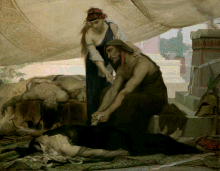Phoenissae
| The Phoenician Women | |
|---|---|

Farewell of Oedipus to the Corpses of His Wife and Sons by Édouard Toudouze
|
|
| Written by | Euripides |
| Chorus | Phoenician Women |
| Characters |
Jocasta Slave Antigone Polyneices Eteocles Creon Teiresias Menoeceus First Messenger Second Messenger Oedipus |
| Mute | daughter of Teiresias guards attendants |
| Place premiered | Athens |
| Original language | Ancient Greek |
| Genre | Tragedy |
| Setting | Before the royal palace of Ancient Thebes (Boeotia) |
The Phoenician Women (Ancient Greek: Φοίνισσαι, Phoinissai) is a tragedy by Euripides, based on the same story as Aeschylus' play Seven Against Thebes. The title refers to the Greek chorus, which is composed of Phoenician women on their way to Delphi who are trapped in Thebes by the war. Unlike some of Euripides' other plays, the chorus does not play a significant role in the plot, but represents the innocent and neutral people who very often are found in the middle of war situations. Patriotism is a significant theme in the story, as Polynices talks a great deal about his love for the city of Thebes but has brought an army to destroy it; Creon is also forced to make a choice between saving the city and saving the life of his son.
Euripides wrote the play around 408 BC, under the influence of a big defeat of his homeland, Athens, which then faced a military disaster.
The play opens with a summary of the story of Oedipus and its aftermath told by Jocasta, who in this version has not committed suicide. She explains that after her husband blinded himself upon discovering that he was her son, his sons Eteocles and Polyneices locked him away in hopes that the people might forget what had happened. He curses them, proclaiming that neither would rule without killing his brother. To avert this, they have agreed to split the country – Polyneices allows Eteocles to rule for one year. When the year expired, Eteocles was to abdicate, allowing his brother to rule for a year. He refused to do so, forcing his brother into exile instead. While exiled, Polyneices went to Argos, where he married the daughter of Adrastus, king of the Argives. He then persuaded Adrastus to send a force to help him reclaim the city. Jocasta has arranged for a cease-fire so that she can mediate between her two sons.
She converses with Polyneices about what his life in exile was like, and then listens to both of their arguments. Polyneices re-explains the situation, and that he is the rightful king. Eteocles replies, saying that he desires power above all else and will not surrender it unless forced to. Jocasta reprimands them both, telling Eteocles his ambition may destroy the city and criticizing Polyneices for bringing an army to sack the city he loves. They argue, but are unable to reach any agreement.
...
Wikipedia
